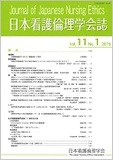Japanese
English
- 販売していません
- Abstract 文献概要
- 参考文献 Reference
日本では戦後、予防接種の注射針の使い回しが行われたこともあって、300万人を超える肝炎ウイルスキャリアが存在する。本研究の目的は、キャリアであることが判明したときの説明と患者によるその受け止め、その後の影響について明らかにすることである。予防接種により感染したと認定されたキャリア10名を対象に半構成的面接を行い、逐語録を質的帰納的に分析した。分析の結果、{説明に納得できた}等で構成される【説明への肯定的評価】、{説明で打ちのめされた}、{病気について理解できなかった}等で構成される【説明への否定的評価】、そして{人生の選択で制限を受けた}、[病気への対応が遅れた]等で構成される【説明による影響】の3コアカテゴリが抽出された。キャリアは他者への感染防止や肝炎発症時の早期発見など気をつけるべきことが多く、丁寧な説明と精神的なケアの重要性が示唆された。
Of the three million hepatitis virus (HBV) carriers or more in Japan, some contracted the virus because vaccination needles were not replaced or sterilized when used among several children after World War II. The aim of the present study was to explore how carriers of HBV were informed of their diagnosis, how they felt upon hearing this information, and how this impacted their lives. Semi-structured interviews were conducted with ten carriers of HBV for whom the contamination was known to be through a vaccination needle. Interview transcripts were analyzed inductively. We extracted the following three core categories: “Positive feelings when I was informed” including {I could fully understand}, “Negative feelings when I was informed” including {I was overwhelmed to hear this} and {I could not understand the disease}, and “Impacts on my life” including {I had fewer options in my life} and [I failed to treat with the disease timely]. This study revealed that careful explanation and mental support by medical professionals are important for carriers, because carries might transmit HBV to others, and be cautious about symptoms of hepatitis.
Copyright © 2019, The Japan Nursing Ethics Associatin. All rights reserved.


